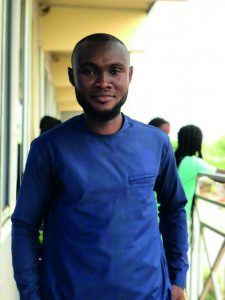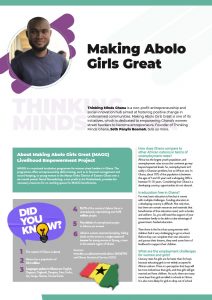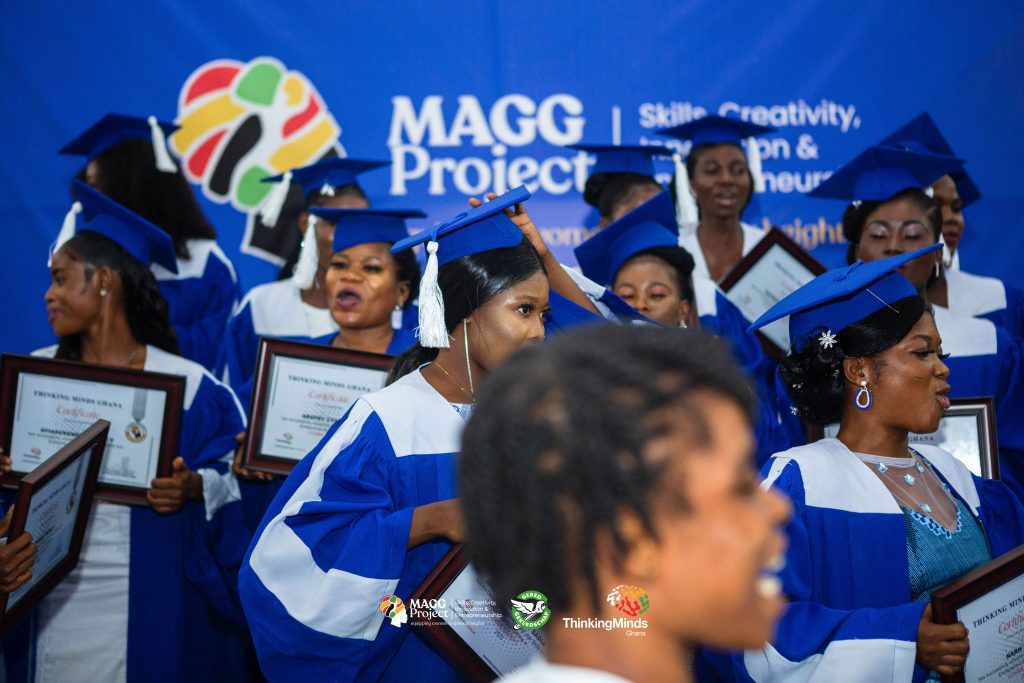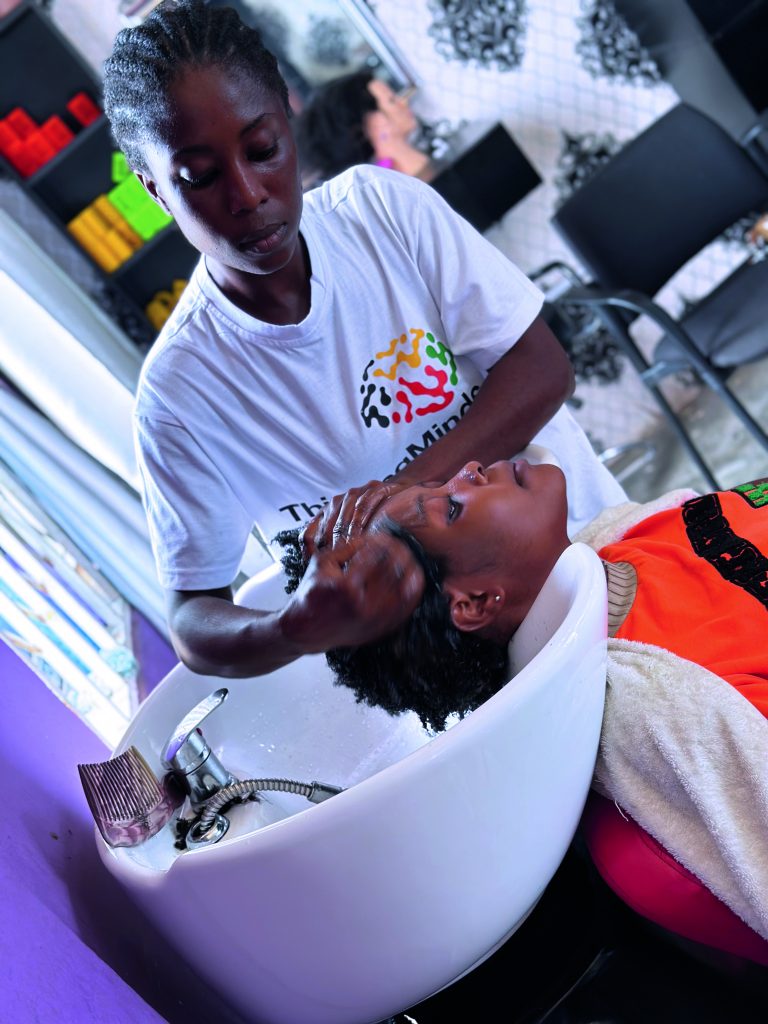Making Abolo Girls Great
Thinking Minds Ghana is a non-profit entrepreneurship and social innovation hub aimed at fostering positive change in underserved communities. Making Abolo Girls Great is one of its initiatives, which is dedicated to empowering Ghana’s women street hawkers to become entrepreneurs. Founder of Thinking Minds Ghana, Seth Panyin Boamah, tells us more.
Did you know?
1. The capital of Ghana is Accra
2. Ghana has a population of 32.1 million
3. Languages spoken in Ghana are: English, Dagaare, Dagbanli, Dangme, Ewe, Frafra, Ga, Gonja, Nzema, Twi and Fante
4. 13.7% of the country’s labour force is unemployed, representing over 1.76 million people.
5. Two thirds of unemployed people in Ghana are women
6. Abolo is a sweet, steamed dumpling. Selling abolo on the streets is a major source of income for young women in Kpong, a town in the eastern region of Ghana
Sources: www.bbc.co.uk/news/world-africa-13433790 and Ghana Statistical Service (GSS)
About Making Abolo Girls Great (MAGG) Livelihood Empowerment Project
MAGG is a vocational incubation programme for women street hawkers in Ghana. The programme offers entrepreneurship skills training, such as in financial management and record-keeping, to young women in the Manya Krobo District of Eastern Ghana over a six-month period. Gered Gereedschap, a non-profit in the Netherlands, provides the necessary resources for co-working spaces for MAGG beneficiaries.
How does Ghana compare to other African nations in terms of unemployment rates?
Africa has the largest youth population, and unemployment rates across the continent go way beyond expected levels. So, unemployment isn’t solely a Ghanaian problem, but an African one. In Ghana, about 70% of the population is between the ages of 1 and 35 years and a whopping 38% is between 15-35 years. Considering that Ghana is a developing country, opportunities do not abound.
Is education free in Ghana?
For now, basic education is free but it comes with multiple challenges. Funding education in a developing country is difficult. Not only that, but there are certain resources and materials that beneficiaries of free education need, such as books and uniform. So, you still need the support of your immediate family to be able to take advantage of government-funded education.
Then there is the fact that young women with children find it very challenging to go to school. Before they can complete their own education and pursue their dreams, they need some form of livelihood to support their children.
What are the employment challenges for women and girls?
Graduation ceremony for the first cohort of the MAGG project
© Thinking Minds Ghana
© Thinking Minds Ghana
© Thinking Minds Ghana
Literacy rates for girls are far lower than for boys because educating girls is not widely accepted in African culture. There is a perception that boys will be more industrious than girls, and that girls will get married and have children. As such, there are many more boys than girls enrolled in schools in Ghana. It is also more likely for girls to drop out of school than boys, especially in rural communities. This is because girls in rural communities are more vulnerable to sexual exploitation and may fall pregnant. They often experience poverty, and if female students don’t have the resources they need for school, they start to feel inferior and unable to continue their education.
Another challenge is that women are largely dependent on men because, in many rural communities, economic empowerment of women is considered improper. For these reasons, women experience higher rates of unemployment.
What can girls do without an education?
Girls who are 15 years old or older can do what we call a traditional apprenticeship. This is where they learn how to sew, cut hair and do other vocational activities. Nevertheless, traditional apprenticeships aren’t always accessible due to the high cost of training, indefinite training periods, absence of training manuals and lack of payment or stipends for trainees. Then there are the unscrupulous practices, which lead girls to doing household chores like washing up or cooking in madams’ homes. Traditional vocational apprenticeships are, essentially, a blanket replication of modules that don’t take into consideration the socioeconomic and cultural setup of so many marginalised women.
Another drawback is that many of these apprenticeships start at 7 am and finish at 6 pm. The majority of young women aged 18-20 will have dropped off the educational ladder because they have had children. Many are victims of sexual exploitation and therefore become single mothers. This is why street hawking is so common among girls and young women.
What is a street hawker?
A street hawker is a person who moves around the city selling inexpensive wares, such as food, electronics or household items, to passers-by. In Ghana, there are huge numbers of street hawkers and many are women with children. Street hawkers work in shifts. For example, one group might work on Mondays and Tuesdays, while another will work on Wednesdays and Thursdays, etc, so they won’t receive a full week’s pay. Another problem is that the wares they sell on the street don’t belong to them. They sell these items for someone else, taking a small commission from the sale. As you can imagine, the money they make is very little and, often, it can’t sustain them or their children. So, many become involved in social vices.
What does Thinking Minds Ghana offer?
In the absence of tailor-made programmes for young people, we realised that we could offer apprenticeships to street hawkers. We had planned to work with existing apprenticeship providers, but realised they weren’t suitable for our ideas so we set up a skills and entrepreneurship training centre and created an accelerated, six-month apprenticeship programme. Apprentices start at 7 am and are finished by 1 pm, which means they can work alongside their apprenticeship. We teach fashion design and cosmetology, which is the study of beauty treatments.
How is the programme funded?
That’s a bigger challenge. We started with community philanthropy, letting the local community know that it has a role to play in lifting street hawkers’ standards of living. We met people, explained what we were doing and were able to secure some funding. But it’s not enough to keep up with the work we do, so we work with volunteers like myself. I’ve been volunteering for the past 4-5 years. We have a team of about 8 people and we volunteer our time to ensure that this programme continues.
How many young women has your programme supported so far?
We’ve trained people in different areas but, with respect to skills training in fashion and cosmetology, it’s currently 55.
What are you most proud of so far?
Firstly, I’m very proud of the fact that, when the local community believes in initiatives like ours, anything is possible. We’ve been able to show people that local community challenges can be solved with local resources.
Secondly, I’m glad that we’ve been able to train 55 young people through our programme, empowering them with vocational skills as well as entrepreneurship training.
We also work on lots of other initiatives besides MAGG. For example, we are a member of the UNESCO Media and Information Literacy Alliance (MIL). We have reached more than 3,000 young people, empowering them to define their information needs, develop skills for accessing information and interpret that information correctly.
What are some examples of apprentices’ achievements after graduating from MAGG?
When our apprentices start training, they are very timid, but midway through the training, they gain confidence, and they don’t want to go back to working on the streets. After completing their training, we have examples of apprentices starting their own businesses – for example, hairstyling from the comfort of people’s verandas.
In our training school, I see students who have experienced a lot of stress and trauma. They have been subjected to abuse, sexual exploitation and human trafficking. As street hawkers, they are more like slaves, making money for other people. Their eyes are opened when they go through our training programme; their aspirations are high. They want to continue to an intermediate course and leap higher on the educational ladder to pursue their dreams. To see somebody, who thought they were hopeless and didn’t believe that they could make anything, find a sustainable means of living is very rewarding.
What is your vision for Thinking Minds Ghana?
My vision is for Thinking Minds Ghana to become a modern enterprise and social innovation hub that trains at least 250 young women every year. I would like to call on people who believe in what I’m doing, people who believe that disenfranchisement, cultural barriers and gender shouldn’t be barriers to girls accessing education or achieving their dreams. I want to call on these people to come on board and support Thinking Minds Ghana, to give us the financial means and resources we need.
We have had applications from young women who want to have an opportunity to be on our apprenticeship programme but, because of our limited resources, we’re only able to support a small group at a time. We have taken the first and second cohort young women. If we get the support we need, we’ll be able to increase our offering and make an even bigger impact.
Meet Seth

Seth has a BSc in Materials Engineering from Kwame Nkrumah University of Science and Technology. He founded Thinking Minds Ghana in January 2019 and became co-lead of 10 Billion Strong Ghana Hub, a movement of leaders committed to building a better future, in May 2023.
Did you want to be an engineer when you were growing up?
Growing up, I was very technical and creative. I liked putting things together and knew I wanted to build things, so, right from the start, I thought about becoming an engineer.
Why did you found Thinking Minds Ghana?
As much as I love engineering, I’m also very inquisitive. Everywhere I went, I was always looking for solutions to problems. My engineering background has helped me a lot. You become analytical, it makes you want to solve things, so now I’m into social engineering!
Do you have another job alongside Thinking Minds Ghana?
As I said, I volunteer my time for Thinking Minds Ghana, so I also have a shop that I personally run. I’m also involved in data collection for research institutions.
What do you see yourself doing in 5 to 10 years?
In 5-10 years, I see myself in a position where I am influencing government policy on gender inclusion, especially in relation to job creation and education policies. I want to remove gender barriers to education and employment and serve people who are deprived of education for reasons that may be cultural or incidental, by deploying a gender lens on recruitment, programme design and content.
What do you have to do now to start influencing government policy in the future?
Over the next few years, I’d like to return to education and study social enterprise, business creation and educational policy. With these qualifications, and through the work I’m doing, I’ll be able to advise the government.
Connect with Seth and Thinking Minds Ghana
![]() facebook.com/ThinkingMindsGhana
facebook.com/ThinkingMindsGhana
Website: www.thinkingmindsghana.org





This is impactful